Exam 3 - BIOL 103 Environmental Issues - Simpson College
1/71
There's no tags or description
Looks like no tags are added yet.
Name | Mastery | Learn | Test | Matching | Spaced |
|---|
No study sessions yet.
72 Terms
What is the most diverse city in the world?
Toronto
What are Canada’s goals for immigration?
Contribute economic development, reunite families, and protect refugees
What policies help to reduce population growth?
Education to improve literacy, women’s empowerment, and family planning services
IPAT the I stands for?
Impact
IPAT the P stands for?
Population size
IPAT the A stands for?
Affluence (wealth)
IPAT the T stands for?
Technology
What does the IPAT model help to explain?
Limitations of the Environmental Kuznets Curve
What does the Environmental Kuznets Curve show?
Hypothesized relationship between environmental degradations and economic productivity
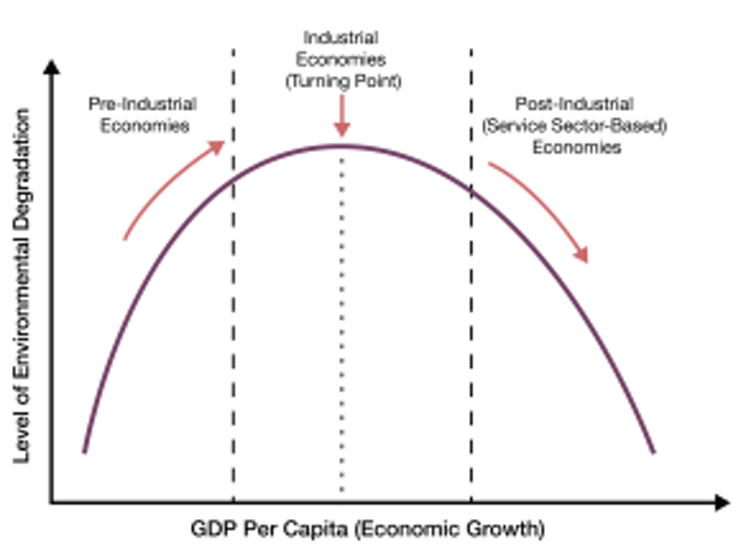
GDP (Gross Domestic Productivity) does what?
Total value of all products produced by a country. Everything produced like cleaning an oil spill or infrastructure.
What is stage two of the Demographic Transition Model?
Industrialization begins, economic benefits occur and the death rate declines
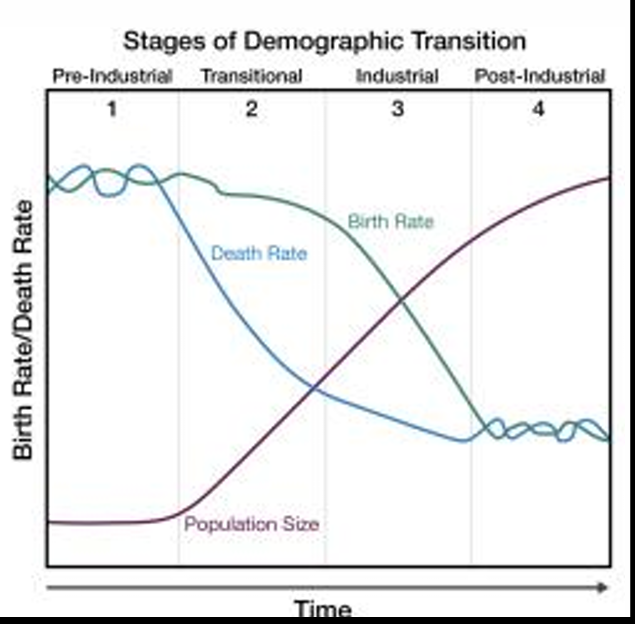
What is stage three of the Demographic Transition Model?
Birth rate declines and population growth rate slows
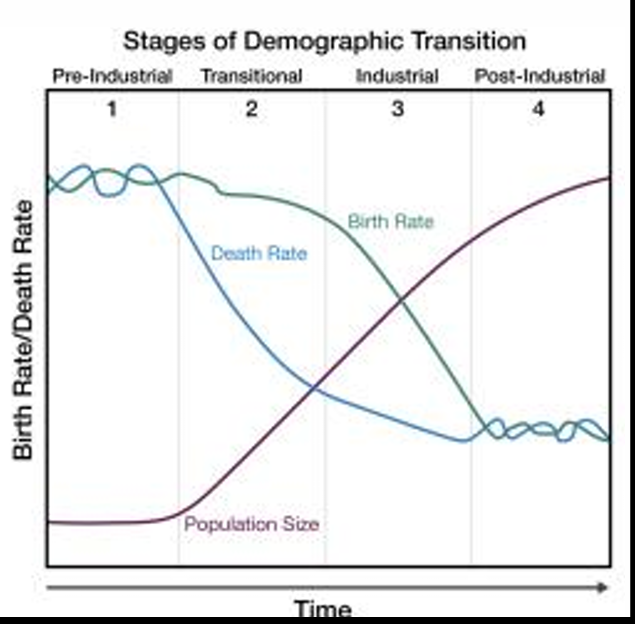
What is stage four of the Demographic Transition Model?
Post-industrial country that is experiencing zero or negative population growth
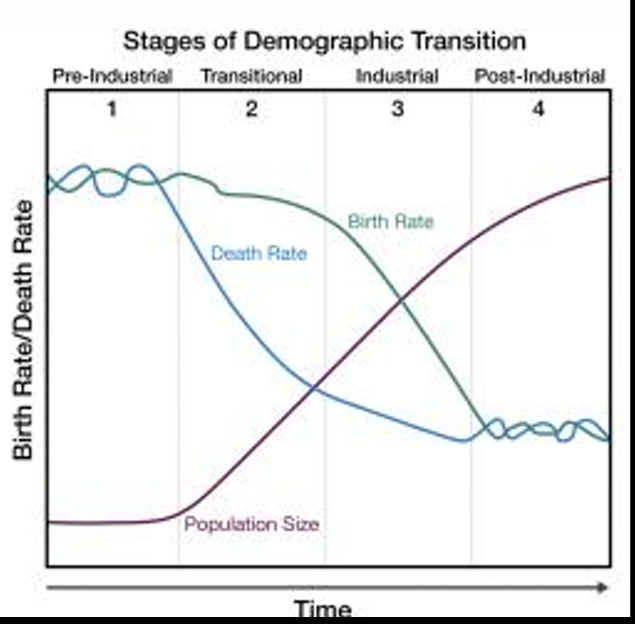
What is stage one of the Demographic Transition Model?
Birth and death rates are high
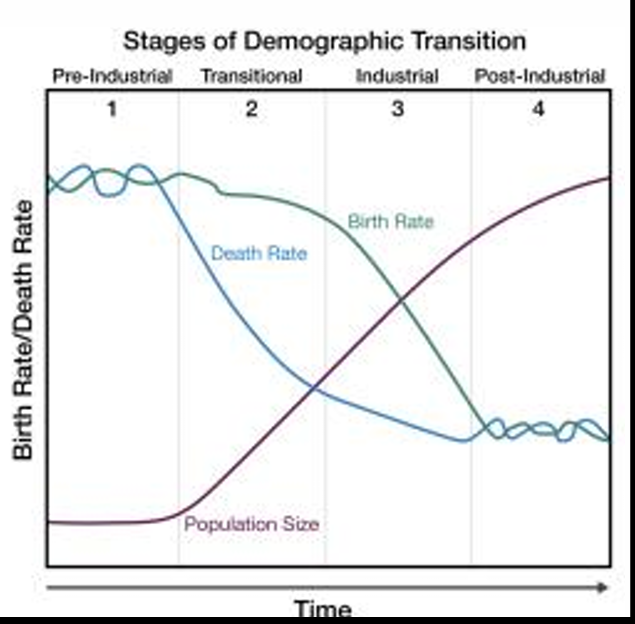
What does HDI stand for?
Human development index
What is HDI?
A calculated value based on quality of life, standard of living, education and literacy. To measure the well-being of people in their respective counties
What does the demographic transition model show?
A relationship between a nations development and population growth
What is permaculture?
design and land management of farming that is cultivated in a natural ecosystem
Describe propreitary
How it is made is secret and only the owner knows how it’s made
What is the first top five agriculture-providing states?
California
What is the second top five agriculture-providing states?
Iowa
What is the third top five agriculture-providing states?
Nebraska
What is the fourth top five agriculture-providing states?
Texas
What is the fifth top five agriculture-providing states?
Illinois
What is the output of America’s farms
~$222 million (~.8% of U>S> GDP)
2023 data of BLS percentage of now ag. goods
19
2023 data of BLS percentage of financial activities
14
2023 data of BLS percentage of profet and business services
14
2023 data of BLS percentage of manufacturing
14
2023 data of BLS percentage of state government
7
2023 data of BLS percentage of federal
3
2023 data of BLS percentage of agriculture
~1
Across the world roughly ____% of our food supply comes from traditional agriculture
20
Polyculture means what?
Growing more than one crop on the same plot of land
What is the example of traditional agriculture?
Polyculture
Transfer of agriculture knowledge and agriculture practices from developed countries to developing countries, started when and where?
1940 in Mexico
Transfer of agriculture knowledge and agriculture practices from developed countries to developing countries, was called what?
Green revolution
What is the definition of food security?
Consistent physical and economic access to sufficient, safe, and nutritious food to meet dietary needs for a healthy life
Marasmus definition
Victims suffer from inadequate calorie and protein intake; dehydration, stomach shrinkage, diarrhea, and weight loss
Kwashiorkor definition
Protein deficiency; bulging abdomen, edema, ecaciation
Macronutrients definition
Carbohydrates, fats, and proteins that make up a large part of our diets
Micronutrients definition
Nutrients that make up a small percentage of our diets (vitamins and minerals)
What is the Gene Revolution?
Biotechnology gave the ability to isolate DNA coding for a desired trait in one organism and then insert it into another
What countries produce the most GMO products?
U.S., Brazil, Argentina, Canada, and India
What is the Parental material?
Provides the raw material for the development of the soil. Which is highly important.
Soil formation occurs with the assistance of what?
Parental material, climate, topography, biota, and time
Soil is a mixture of what?
Minerals, water, decaying organic matter, rock fragments, and gases
What are the soil textures?
Sand, silt, and clay
What is Soil Structure?
Arrangement of soil particles into groups called aggregates
U.S. __% of the land is used for domesticated animals
25
U.S. ___% of the land is used for cultivated row crops
18
Globally, drylands cover about ___% of the worlds land surface
41
What can contribute to the process of desertification?
Unsustainable irrigation practices
In Iowa we lose 1 lbs of soil for __?
1 lbs of corn produced
In Iowa we lose 3 lbs of soil for __?
1 lbs of soybeans
What is Salinization?
The salt concentration of soil increasing. Affecting the irrigating of crops
2023 data from the BLS (Bureau of Labor Statistics) all of them
Now ag. goods, financial activities, professional and business services, manufacturing, state government, federal, and ag.
What is the Dirty Dozen?
A list of twelve fruits and veggies that are found to have the highest pesticide residues, according to the Environmental Working Group
Globally agriculture accounts for about ____% of groundwater use
70
Irrigation speeds up what?
Erosian
Irrigation causes leaching. Meaning what?
Speeding up movement of minerals deeper in the soil
Drought, extreme erosion, and soil infertility causes land to lose more than ___% of its productivity. (desertification)
10
What is one of the main driving factors of human-caused climate change?
Industrialized farming
Name the wastes from AFO (Animal Feeding Operations)
Nitrogen, urine, manure, hormones, cleaning agents, greenhouse gases, and pathogens
Desertification is the degradation of?
Arid, semi-arid, and dry subhumid land areas
Overcultivation, farming vertically on slopes, and overgrazing cause what?
Soil loss
What covers one-third of earths land surface and depress biodiversity
Cultivated ecosystems
Continued irrigation and overirrigation can cause?
Waterlogging and salinization
What are the top five of the dirty dozen?
Strawberries, spinach, kale collard & mustard greens, peaches, and pears
What is known as the endocrine disruptor?
Atrazine an herbicide
To grow foods more sustainably we need to enhance our protection of what?
Soils, rethink how we raise livestock, lesson reliance on synthetic fertilizers, nonrenewable energy sources, pesticides, and irrigation
How can farmers compact soil erosion and soil loss?
Cover crops, contour farming, no-till farming, and polyculture farming